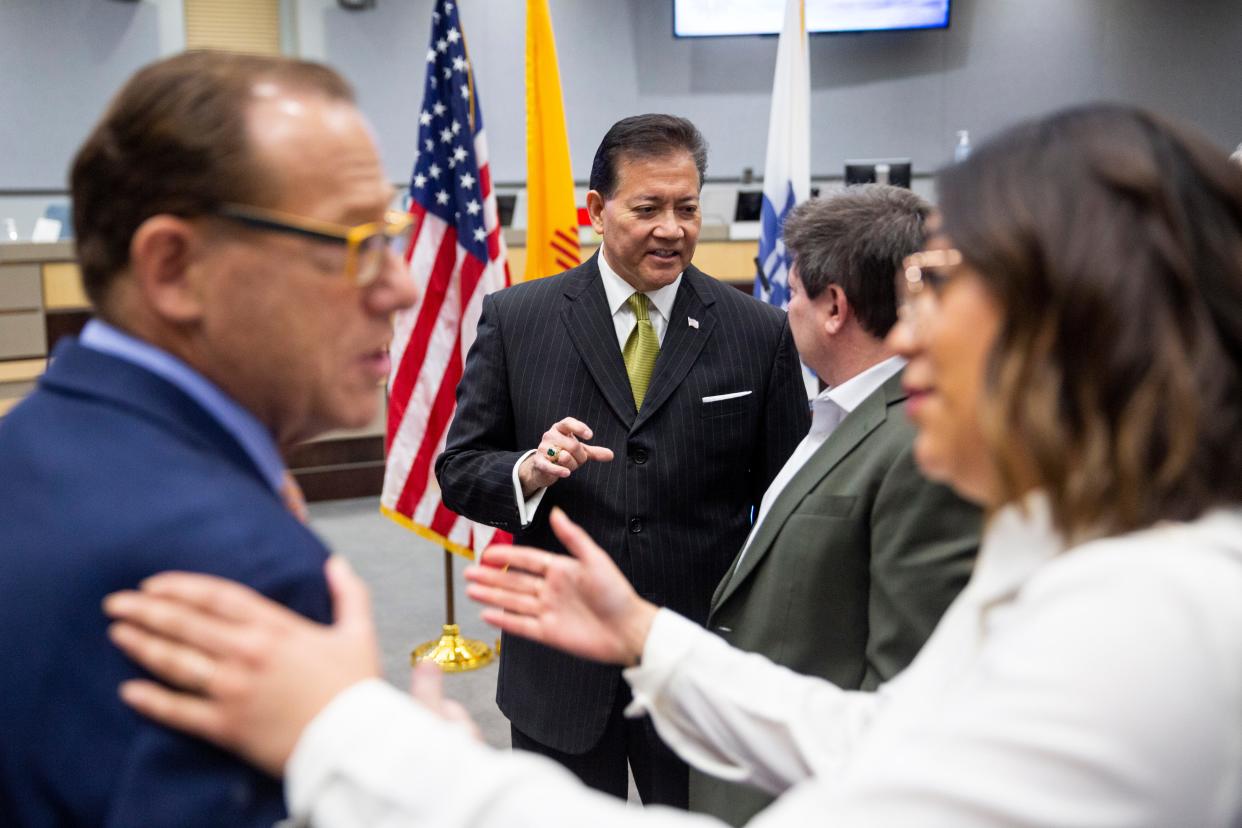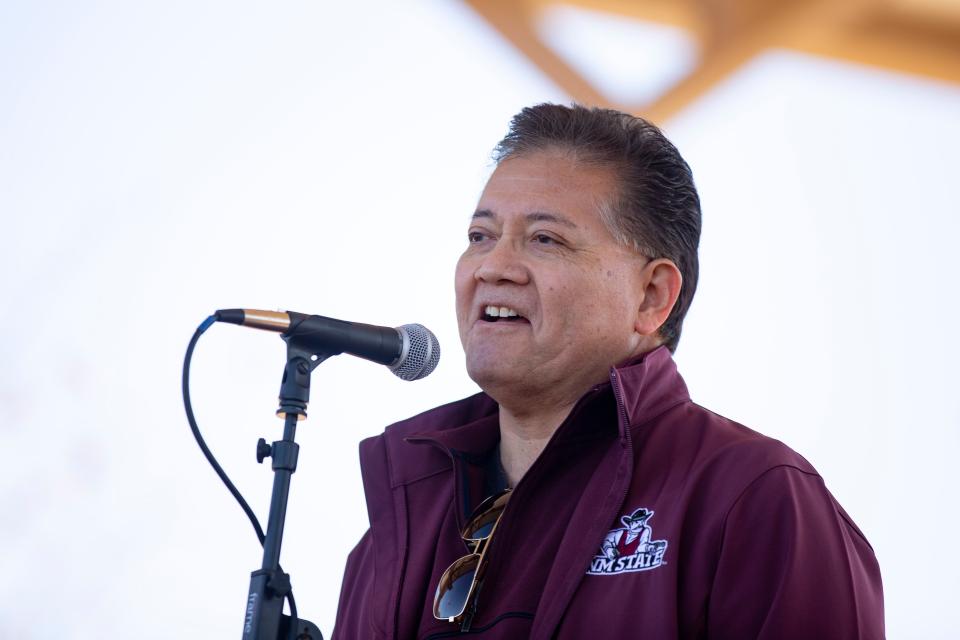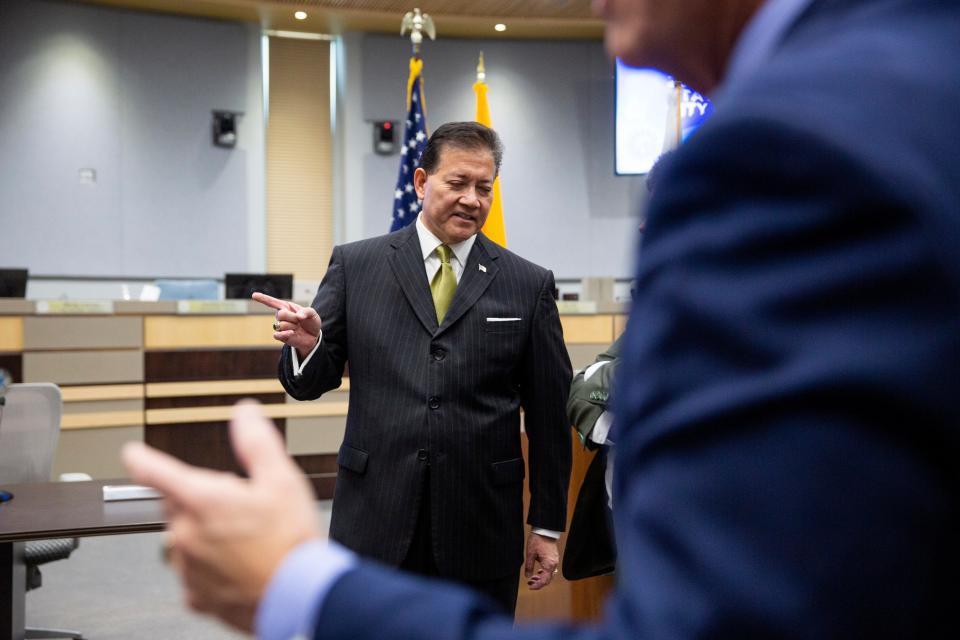Mayor delivers swan song after 20 years of 'smart growth' development

LAS CRUCES – One last time, Mayor Ken Miyagishima delivered a State of the City address arguing to dozens that Las Cruces remains in a strong position after decades of development.
Miyagishima, who announced his intention not to run in the upcoming mayoral election, focused his 30-minute speech on an overview of his two-decade career in public service. Smart growth, a concept Miyagishima said was "much-ridiculed" initially, has led to stable and mindful development over his tenure as head of the Las Cruces City Council, he said.
"From a contentious beginning, and tentatively at first, we began to plan consciously for the future, assessing our strengths and shared values as a community, identifying ways to balance inevitable growth with those strengths and values, and developing a common, evolving vision of who we wanted to be," he said. "That these principles and process seem self-evident to us now is a mark of our progress as a city."
Half the city council, several judges, county officials, New Mexico State University deans and officials from El Paso and the Mexican consulate filled city hall's council chambers for Miyagishima's 16th and final address.
Miyagishima's impact on Las Cruces and its residents is balanced with the realities of his role. Unlike Albuquerque or Santa Fe, the Mayor of Las Cruces is not an executive head. That position belongs to the unelected city manager. Instead, Miyagishima is the City Council's head, which oversees the city manager and the city's budget.
But despite a lack of access to many of the critical levers of power, Miyagishima said his influence has focused on guiding Las Cruces through rapid growth, a decade of recession-stifled development and a pandemic.
During his final address, Miyagishima gave the crowd his thoughts about what challenges they might face in the years ahead and sought to impart his hope for the future.
Absent from the mayor's speech was mention of cannabis and police reform – two items he spoke to the Sun-News about after the speech.
"It's really the end of an era," Councilor Johanna Bencomo said after the speech. Mayor Pro Temp Kasandra Gandara echoed her sentiment.
Mayor's rise in 2007
Much of Miyagishima's speech reviewed his perspective on the last two decades of development in Las Cruces. During that period, Las Cruces' population boomed. In 2000, the population hovered below 75,000, according to the U.S. Census. Twenty years later, the population reached about 111,000.
"When I first came into office, the overriding concern was about land development at the margins of our city, development that many residents – including me, serving at the time as a city councilor – thought was taking place carelessly and without direction, and with little regard for its impact on our community as a whole," Miyagishima said.
Miyagishima said that concern, buttressed by worries about transparency, led to his first term as Mayor in 2007. In that election, Miyagishima ousted incumbent Bill Mattiace by 74 votes. It was the third time Miyagishima and Mattiace squared off for the mayoral seat.
Miyagishima said that election brought a shift in thinking to Las Cruces.
"We all knew Las Cruces was going to grow. The larger questions, though, had barely been considered," he said.
Miyagishima said the ultimate result was a mindful approach to development. He added that the effort culminated in the 2020 Elevate Las Cruces Comprehensive Plan.
The Great Recession stifled that effort in 2008, which halted development efforts across the U.S. But Miyagishima said the hope remained strong.
Landmarks represent progress

New public works exemplify the positive change, the mayor said.
"Some of the improvements are hard to miss, starting with our City Hall, our energy-efficient Convention Center, our beautiful Aquatic Center, the Museum of Nature and Science, and our Public Safety Complex," Miyagishima said.
Miyagishima also pointed to the twice-weekly Farmer's Market and other downtown happenings as proof that mindful development improved Las Cruces. Part of that approach was to include honoring old Las Cruces' look and feel, Miyagishima said.
"During the period of intensive expansion, it became clear that our older neighborhoods had for many years been subsidizing growth at the margins of our city," Miyagishima said, adding that Las Cruces' traditional neighborhoods are often "left behind."
"We resolved that this wasn't going to happen in Las Cruces," he said, noting efforts to repair streets.
The mayor also touted efforts like Lift Up Las Cruces and a rise in the City's minimum wage.
"Few visitors fail to feel the energy that exists in our community. As amenities expand, there's more and more reason for young people to consider staying here to build their lives and families; for new businesses to open; for elders to age in place and continue contributing to our community," he said.
Another proposed change in philosophy

As Miyagishima looked to the future, he noted that Las Cruces no longer needs to go "hat in hand" to firms seeking to invest in Las Cruces.
"Our recruitment is now based on different questions. Will a new company provide our workers with high wages and opportunities for advancement? Will it enhance or diminish our quality of life? Do its leaders understand who we are as a city, and will they become active partners in our progress from here?" he asked rhetorically.
Miyagishima also noted that climate change challenges faced by Las Cruces and its residents should play an integral role in future policy choices. The mayor also said the city should continue intervening in El Paso Electric rate cases.
"Finally, I would like to note that while we prepare as best we can for all contingencies, new challenges can surge up without warning," Miyagishima said. "Another challenge that has emerged over the last few years, not just here but in cities across the country, is the rising incidence – or at least greater visibility – of the severe problems some have with mental illness and drug addiction, domestic violence, and cases of property damage, along with what seems to be more people experiencing homelessness than ever before."
Miyagishima said he believed the city was in an excellent place to address those challenges by noting Las Cruces Fire Department's Mobile Health Unit, Project LIGHT, and Community of Hope.
"Those experiencing these kinds of crises, however, are not of greater or lesser importance to us than the people who live or have businesses in those affected neighborhoods," he said.
But the mayor said he remained optimistic that Las Cruces could handle any challenge the city faced.
"We'll address this challenge the same way we've successfully addressed so many others over the years, working together to make life better for each and every one of us – day after day, week after week, challenge after challenge – because that's what great cities do," he said.
Police reform and cannabis absent from the address
Miyagishima did not mention the explosion of cannabis sales ― and subsequent gross receipts taxes ― in Las Cruces and did not mention efforts to reform Las Cruces Police Department following high-profile shootings. However, Miyagishima spoke on both issues at the prompting of a Sun-News question after the speech.
On cannabis, Miyagishima said he didn't know how to incorporate it into his speech. Miyagishima has publicly opposed cannabis legalization and voted against efforts to lessen barriers to new dispensaries.
"We live in a democracy, and the majority wins," Miyagishima said. "That's why you don't see trying to trip it up."
On police reform, Miyagishima said he wants to see the yield of changes implemented before creating new changes. He pointed to the police auditor and fire department mental health initiatives as proof.
"It's important that we give what we think is going to work a chance to work," Miyagishima said. "If it still doesn't work, then then we need to have another discussion."
Reactions from the crowd
Dr. Bobbi Green, Doña Ana County NAACP president, agreed with Miyagishima's message that Las Cruces has improved economically.
"And I think that as a native of Las Cruces, it is very important to me to see the city thrive under the mayor's leadership. We've done some great things, as he outlined in this in his speech today," Green said.
Green has also been an outspoken advocate for police reform in Las Cruces. She said she noticed the topic's absence from Miyagishima's speech. However, Green said she appreciated Miyagishima's accessibility, including a recent appearance at an NAACP meeting.
Bencomo said she respected Miyagishima's 20-year career even if they didn't always see eye to eye. However, she added that she wasn't surprised Miyagishima left cannabis out of his speech.
"Public service is really hard, and he's done it for a long time, and he's done it well," Bencomo said. "I believe he loves the city, and I think that shows."
Justin Garcia covers public safety and local government in Las Cruces. He can be reached via email at JEGarcia@lcsun-news.com, via phone or text at 575-541-5449, or on Twitter @Just516Garc.
What else is going in the Mesilla Valley?
Council approves redevelopment efforts for El Paseo, West Picacho
Meet the millennial who bought a blighted ghost town in far-West Texas
'Con Amor,' from Anahy Nuñez: Local artist makes her mark in mural
Jason Hooten takes over New Mexico State men's basketball program
This article originally appeared on Las Cruces Sun-News: Mayor delivers swan song after 20 years of 'smart growth' development

